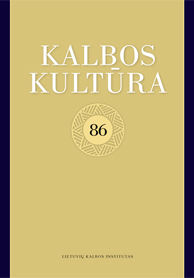Tarptautinių žodžių vartosenos aktualijos latvių kalboje
Topical Issues of Using Foreign Words in the Latvian Language
Author(s): Dzintra ŠulceSubject(s): Semantics, Baltic Languages
Published by: Lietuvių Kalbos Institutas
Keywords: foreign words; assimilation of foreign words; contemporary problems of the use of foreign words;
Summary/Abstract: Nowadays, the term ‘foreign word’ is generally used in the following meaning: a word borrowed from another language and grammatically adapted to the system of the recipient language, the foreign origin of which (according to certain phonetic and/or morphological characteristics) is perceived by the majority of recipient language users. In order to reproduce a foreign word in a different language, it is assimilated on the basis of three principles:1) phonetic assimilation;2) morphological assimilation;3) semantic assimilation – the borrowing keeps the original meaning, but the meaning in the recipient language can change.The most frequently used foreign words in a language are usually compiled in dictionaries of foreign words indicating the original language, giving explanation of the meaning and the specific features of their usage in the corresponding recipient language. At present, the latest issues of foreign language dictionaries published in Latvia are (1999, 2005, 2008), which give the user an opportunity to check the spelling of foreign words and their meaning. The Terminology Commission and Latvian Language Expert Commission are the bodies that regularly make decisions on reproduction and spelling of foreign words. There are also such dictionaries in the Lithuanian language – Tarptautinių žodžių žodynas (2007, 2008, 2010); they are also available on the Internet, for example, http://www.zodziai.lt/, http://www.tzz.lt/ and others; decisions on the most important foreign word usage issues are taken by the Lithuanian State Language Commission (Valstybinė lietuvių kalbos komisija). Lithuanian linguists (like in Latvia) are worried about the rapid inflow of anglicisms into the language.In Latvian a large part of foreign words are indeclinable, and hence we can assert that they were once not sufficiently adapted to the Latvian language, for example, kino, radio, kakao, rokoko, komunikē, kapučīno, kivi, ampluā, ragū, auto, loto, moto, eiro. By contrast, Lithuanians have more successfully managed most of these words and have fully adapted them to the Lithuanian grammar system, for example, kinas, kakava, radijas, rokokas, komunikatas, kapučinas, euras.The analysed material shows that there will always be difficulties in reproducing foreign words, their spelling and usage (not only in the Latvian language); they should be viewed from various aspects and the most appropriate decisions should be made in any given situation.
Journal: Bendrinė kalba (iki 2014 metų – Kalbos kultūra)
- Issue Year: 2013
- Issue No: 86
- Page Range: 124-130
- Page Count: 7
- Language: Lithuanian

